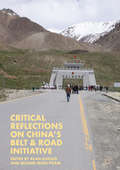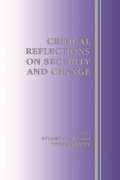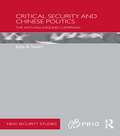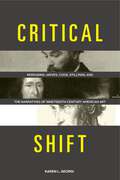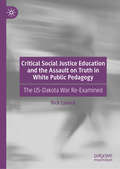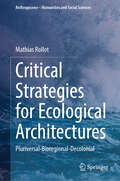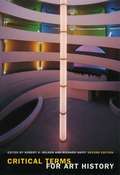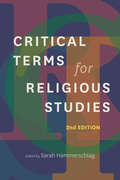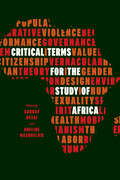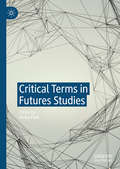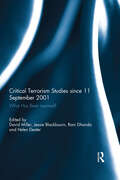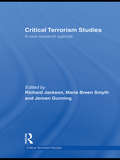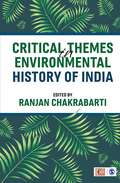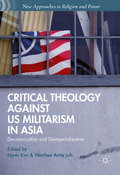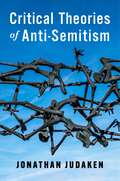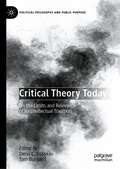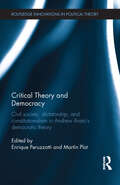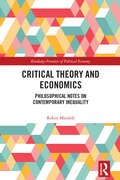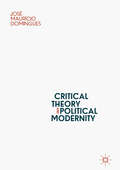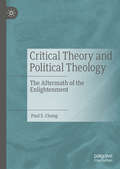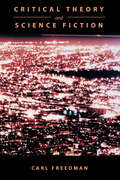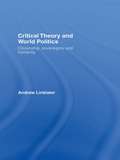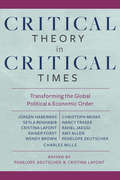- Table View
- List View
Critical Reflections on China’s Belt & Road Initiative
by Alan Chong Quang Minh PhamThis book provides insights into China's Belt and Road Initiative (BRI) from Asia Pacific and the Middle East. It offers critical perspectives from various directions, not excluding historical investigations, human geography approaches and neo-Marxist inclinations.China’s Belt and Road Initiative (BRI) represents one of the biggest geopolitical visions since the Cold War and offers the possibilities of an intercontinental vision of Aid politics, along with prospects for pan-Asianism. By and large, any geopolitical vision that purports to foster inter-regional dialogue and materialist development of peoples and economies is bound to have its flaws. The Belt and Road Initiative bears hallmarks of the socio-political tradition of Chinese authoritarian infrastructure politics while also offering a possible alternative to the so-called ‘Washington Consensus’ of free markets, deregulation and a shift towards liberal democracy.Additionally, the Belt and Road Initiative opens up wide open intellectual spaces for dialogues between Asians, Arabs and Westerners on the meaning of inclusive inter-continental relationships in philosophy, geography and economics. The significance of this is often underplayed in Chinese official statements whereas this book introduces these possibilities within its assorted sections.
Critical Reflections on Security and Change
by Stuart Croft Terriff TerryThe contributors reflect critically on security studies since the 1980s. They conclude that analysts and policy-makers have not been able to respond well to the changes that have occurred and that they must revise their approach if they are to meet the challenges of the future.
Critical Security and Chinese Politics: The Anti-Falungong Campaign (PRIO New Security Studies)
by Juha A. VuoriThis book examines how critical approaches to security developed in Europe can be used to investigate a Chinese security issue - the case of the Falungong. The past few decades have produced a rich field of theoretical approaches to ‘security’ in Europe. In this book, the security-specific notions of securitization, the politics of insecurity, and emancipation are used as analytical approaches to investigate the anti-Falungong campaign in the People’s Republic of China. This campaign, launched in 1999, was the largest security-related propaganda campaign since 1989 and was directed against a group of qigong-practitioners who were presented as a grave threat to society. The campaign had major impacts as new security legislation was established and human rights organizations reported severe mistreatment of practitioners. This book approaches one empirical case with three approaches in order to transcend the tendency to pit one approach against another. It shows how they highlight different aspects in investigation, and how they can be combined to gain more comprehensive insights, and thereby invigorate renewed debate in the field. Furthermore, this is used as a vehicle to discuss more general philosophical issues of theory, development, and theory development and will assist students to comprehend the effects research framework selection has on a piece of research. Such discussions are necessary in order to apply the frameworks in investigations that go beyond the socio-political context they were originally developed in. This book will be of interest to students of critical security studies, Chinese politics, research methods and IR in general.
Critical Shift: Rereading Jarves, Cook, Stillman, and the Narratives of Nineteenth-Century American Art
by Karen L. GeorgiAmerican Civil War–era art critics James Jackson Jarves, Clarence Cook, and William J. Stillman classified styles and defined art in terms that have become fundamental to our modern periodization of the art of the nineteenth century. In Critical Shift, Karen Georgi rereads many of their well-known texts, finding certain key discrepancies between their words and our historiography that point to unrecognized narrative desires. The book also studies ruptures and revolutionary breaks between “old” and “new” art, as well as the issue of the morality of “true” art. Georgi asserts that these concepts and their sometimes loaded expression were part of larger rhetorical structures that gainsay the uses to which the key terms have been put in modern historiography.It has been more than fifty years since a book has been devoted to analyzing the careers of these three critics, and never before has their role in the historiography and periodization of American art been analyzed. The conclusions drawn from this close rereading of well-known texts challenge the fundamental nature of “historical context” in American art history.
Critical Shift: Rereading Jarves, Cook, Stillman, and the Narratives of Nineteenth-Century American Art
by Karen L. GeorgiAmerican Civil War–era art critics James Jackson Jarves, Clarence Cook, and William J. Stillman classified styles and defined art in terms that have become fundamental to our modern periodization of the art of the nineteenth century. In Critical Shift, Karen Georgi rereads many of their well-known texts, finding certain key discrepancies between their words and our historiography that point to unrecognized narrative desires. The book also studies ruptures and revolutionary breaks between “old” and “new” art, as well as the issue of the morality of “true” art. Georgi asserts that these concepts and their sometimes loaded expression were part of larger rhetorical structures that gainsay the uses to which the key terms have been put in modern historiography.It has been more than fifty years since a book has been devoted to analyzing the careers of these three critics, and never before has their role in the historiography and periodization of American art been analyzed. The conclusions drawn from this close rereading of well-known texts challenge the fundamental nature of “historical context” in American art history.
Critical Social Justice Education and the Assault on Truth in White Public Pedagogy: The US-Dakota War Re-Examined
by Rick LybeckThis book explores tensions between critical social justice and what the author terms white justice as fairness in public commemoration of Minnesota’s US-Dakota War of 1862. First, the book examines a regional white public pedagogy demanding “objectivity” and “balance” in teaching-and-learning activities with the purpose of promoting fairness toward white settlers and the extermination campaign they once carried out against Dakota people. The book then explores the dilemmas this public pedagogy created for a group of majority-white college students co-authoring a traveling museum exhibit on the war during its 2012 sesquicentennial. Through close analyses of interviews, field notes, and course artifacts, this volume unpacks the racial politics that drive white justice as fairness, revealing a myriad of ways this common sense of justice resists critical social justice education, foremost by teaching citizens to suspend moral judgment toward symbolic white ancestors and their role in a history of genocide.
Critical Strategies for Ecological Architectures: Pluriversal-Bioregional-Decolonial (Anthropocene – Humanities and Social Sciences)
by Mathias RollotThis book addresses the alarming state of the planet and considers a potential new role for architecture in the Anthropocene. It explores ways in which architecture could contribute to solutions, as well as how the discipline should prepare for the future. Drawing on other disciplines such as bioregionalism, animalism and decolonial thinking, it demonstrates how architecture can extend its relevance. The book introduces new theoretical approaches that encourage completely different ways of thinking, showing and designing. It introduces concepts such as human energy, decolonial bioregionalism, and emancipatory architecture, which serve to challenge anthropocentric theories and promote more sustainable architectural practices. This book makes an ethical appeal to architects and non-architects alike, proposing new strategies for thinking, teaching and creating a wholly different kind of architecture for a rapidly changing world. In doing so, it addresses the challenges facing contemporary societies and ecological changes, demonstrating how the ecological humanities can transform architecture as a field and radically alter its history, references, values, and aims. The book aims to contribute to a metamorphosis of architecture towards greater ecological and emancipatory capacity, and towards pluriversal bioregions.
Critical Terms for Art History (2nd edition)
by Robert S. Nelson Richard Shiff"Art" has always been contested terrain, whether the object in question is a medieval tapestry or Duchamp's Fountain.
Critical Terms for Art History, Second Edition (Critical Terms Ser.)
by Nelson, Robert S.; Shiff, Richard"Art" has always been contested terrain, whether the object in question is a medieval tapestry or Duchamp's Fountain. But questions about the categories of "art" and "art history" acquired increased urgency during the 1970s, when new developments in critical theory and other intellectual projects dramatically transformed the discipline. The first edition of Critical Terms for Art History both mapped and contributed to those transformations, offering a spirited reassessment of the field's methods and terminology. Art history as a field has kept pace with debates over globalization and other social and political issues in recent years, making a second edition of this book not just timely, but crucial. Like its predecessor, this new edition consists of essays that cover a wide variety of "loaded" terms in the history of art, from sign to meaning, ritual to commodity. Each essay explains and comments on a single term, discussing the issues the term raises and putting the term into practice as an interpretive framework for a specific work of art. For example, Richard Shiff discusses "Originality" in Vija Celmins's To Fix the Image in Memory, a work made of eleven pairs of stones, each consisting of one "original" stone and one painted bronze replica. In addition to the twenty-two original essays, this edition includes nine new ones—performance, style, memory/monument, body, beauty, ugliness, identity, visual culture/visual studies, and social history of art—as well as new introductory material. All help expand the book's scope while retaining its central goal of stimulating discussion of theoretical issues in art history and making that discussion accessible to both beginning students and senior scholars. Contributors: Mark Antliff, Nina Athanassoglou-Kallmyer, Stephen Bann, Homi K. Bhabha, Suzanne Preston Blier, Michael Camille, David Carrier, Craig Clunas, Whitney Davis, Jas Elsner, Ivan Gaskell, Ann Gibson, Charles Harrison, James D. Herbert, Amelia Jones, Wolfgang Kemp, Joseph Leo Koerner, Patricia Leighten, Paul Mattick Jr., Richard Meyer, W. J. T. Mitchell, Robert S. Nelson, Margaret Olin, William Pietz, Alex Potts, Donald Preziosi, Lisbet Rausing, Richard Shiff, Terry Smith, Kristine Stiles, David Summers, Paul Wood, James E. Young
Critical Terms for Religious Studies, Second Edition (Critical Terms)
by Sarah HammerschlagA new edition of a classic resource—composed of twenty-three essays written specifically for this volume. First published nearly thirty years ago, Critical Terms for Religious Studies proved a vital resource for an emerging interdisciplinary conversation. We still use much of the same language in the study of religion, but fresh concerns have both changed the meaning of terms and given rise to new terms altogether. This edition consists of twenty-three entirely new essays that offer students and scholars alike the tools to historicize and evaluate the shifting role of familiar and emerging critical terms in religious studies. These are “critical terms” both because they are important in our cultural moment and because thinking through them reveals how religions are embedded in and shaped by material, social, economic, and political forces. A shared conviction unites contributors from a range of traditions and methodologies: a recognition that our world is saturated by the persistence of religious traditions as shape-shifting (not static or transcendent) forces of authority, as powerful today as ever before.
Critical Terms for the Study of Africa (Critical Terms)
by Gaurav Desai Adeline MasquelierFor far too long, the Western world viewed Africa as unmappable terrain—a repository for outsiders’ wildest imaginings. This problematic notion has had lingering effects not only on popular impressions of the region but also on the development of the academic study of Africa. Critical Terms for the Study of Africa considers the legacies that have shaped our understanding of the continent and its place within the conceptual grammar of contemporary world affairs. Written by a distinguished group of scholars, the essays compiled in this volume take stock of African studies today and look toward a future beyond its fraught intellectual and political past. Each essay discusses one of our most critical terms for talking about Africa, exploring the trajectory of its development while pushing its boundaries. Editors Gaurav Desai and Adeline Masquelier balance the choice of twenty-five terms between the expected and the unexpected, calling for nothing short of a new mapping of the scholarly field. The result is an essential reference that will challenge assumptions, stimulate lively debate, and make the past, present, and future of African Studies accessible to students and teachers alike.
Critical Terms in Futures Studies
by Heike PaulThis volume provides the essential vocabulary currently employed in discourses on the future in 50 contributions by renowned scholars in their respective fields, which examine future imaginaries across cultures and time. Not situated in the field of “futurology” proper, it comes at future studies ‘sideways’ and offers a multidisciplinary treatment of a critical futures’ vocabulary. The contributors have their disciplinary homes in a wide range of subjects – history, cultural studies, literary studies, sociology, media studies, American studies, Japanese studies, Chinese studies, and philosophy – and critically illuminate numerous discourses about the future (or futures), past and present. In compiling such a critical vocabulary, this book seeks to foster conversations about futures in study programs and research forums and offers a toolbox for discussing them with an adequate degree of complexity.
Critical Terrorism Studies since 11 September 2001: What Has Been Learned?
by David Miller Jessie Blackbourn Helen Dexter Rani DhandaAcademic studies of ‘terrorism’ grew exponentially in number after the September 11 attacks. The problem was that much of this work of ‘orthodox’ terrorism studies was biased, often shoddily researched and was too closely identified with the power centres of Western states. Its denizens were often former and sometimes current officials or officers in the military, intelligence services or the security industry or were funded by them.In response the project of Critical Terrorism Studies was intended to give a more rounded account of political violence in the world. It focuses on neglected issues like state terrorism, Western counterinsurgency, propaganda and misinformation.More than a decade since the founding of the critical project, this book asks what has been learned. It showcases leading examples of critical terrorism studies and presents an agenda for the expansion of an evidence-based approach to political violence and terrorism. With chapters by leading authorities such as Joseba Zulaika, Michael Stohl, Mary Hickman and Richard Jackson, the book evaluates how far the critical project has come and where it is going next.This book was published as a special issue of Critical Studies on Terrorism.
Critical Terrorism Studies: A New Research Agenda (Routledge Critical Terrorism Studies)
by Richard Jackson Jeroen Gunning Marie Breen SmythIn response to the growth of a critical perspective on contemporary issues of terrorism, this edited volume brings together a number of leading scholars to debate the new subfield of 'critical terrorism studies'. In the years since the 9/11 attacks, terrorism studies has undergone a major transformation from minor subfield of security studies into a large stand-alone field, and is probably one of the fastest expanding areas of research in the Western academic world. However, much of the literature is beset by a number of problems, limiting its potential for producing rigorous empirical findings and genuine theoretical advancement. In response to these weaknesses in the broader field, a small but increasing number of scholars have begun to articulate a critical perspective on contemporary issues of terrorism. This volume brings together a number of leading scholars to debate the need for and the shape of this exciting new subfield.The first part of the volume examines some of the main shortcomings and limitations of orthodox terrorism studies, while the second examines exactly what a 'critical' terrorism studies would look like. Contributors from a variety of methodological and disciplinary perspectives give this volume diversity, and it will lay the foundations for, and provoke debate about, the future research agenda of this new field. This book will be of much interest to students of critical security studies, terrorism studies and IR theory in general. Richard Jackson is Reader in the Department of International Politics, Aberystwyth University, where he is also Senior Researcher at the Centre for the Study of Radicalisation and Contemporary Political Violence (CSRV). He is the founding editor of the journal, Critical Studies on Terrorism. Marie Breen Smyth is Director of the Centre for the Study of Radicalisation and Contemporary Political Violence (CSRV) at Aberystwyth University. She is a Reader in International Politics and co-editor of the journal, Critical Studies on Terrorism. Jeroen Gunning is Lecturer in International Politics at Aberystwyth University, Deputy Director of the Centre for the Study of Radicalisation and Contemporary Political Violence and co-editor of the journal, Critical Studies on Terrorism.
Critical Themes in Environmental History of India
by Ranjan ChakrabartiA first of its kind in India, the book addresses the fundamental questions of environmental concern and enquires into the complex patterns of human–nature interaction within the discipline of environmental history in India. This book delves into history to examine a number of critical themes, such as waterbodies and water, forests, land use, wildlife and the issue of the history of climate in India. It focuses on the methodological and historiographical aspects of environmental history and raises new questions to open up new windows leading to fresh research questions. The book argues that environmental history would serve as an important gateway to the history of the human–nature relationship, for example, exploring the role of water history would help in understanding the present context of water crisis in Indian cities. Critical Themes in Environmental History of India is a powerful reminder of the fact that in the context of Indian history it is now necessary to listen to the voice of nature more carefully.
Critical Theology against US Militarism in Asia: Decolonization and Deimperialization (New Approaches to Religion and Power)
by Nami Kim Wonhee Anne JohDrawing on cultural studies scholar Kuan-Hsing Chen's threefold notion of decolonization, deimperialization, and de-cold-war, this book provides analyses of the interrelated issues concerning the relationship between Christianity and the United States' imperialist militarism in the Asia Pacific. Contributors explore the effects of US imperialist militarism on the formation of Asian and Asian American collective subjectivity and inter/intra subjectivity. The book investigates the ways in which Christianity (broadly defined), in its own complexity, has been complicit in maintaining and reinforcing US imperialist military agendas in both national and international contexts. Conversely, the volume also discusses the various sites and instances where Christianity has managed to serve as a force of resistance against US imperialist militarism.
Critical Theories of Anti-Semitism (New Directions in Critical Theory #86)
by Jonathan JudakenDespite its persistence and viciousness, anti-Semitism remains undertheorized in comparison with other forms of racism and discrimination. How should anti-Semitism be defined? What are its underlying causes? Why do anti-Semites target Jews? In what ways has Judeophobia changed over time? What are the continuities and disconnects between medieval anti-Judaism and the Holocaust? How does criticism of the state of Israel relate to anti-Semitism? And how can social theory illuminate the upsurge in attacks on Jews today?Considering these questions and many more, this book is at once a philosophical reflection on key problems in the analysis of anti-Semitism and a history of its leading theories and theorists. Jonathan Judaken explores the methodological and conceptual issues that have vexed the study of Judeophobia and calls for a reconsideration of the definitions, categories, and narratives that underpin overarching explanations. He traces how a range of thinkers have wrestled with these challenges, examining the theories of Jean-Paul Sartre, the Frankfurt School, Hannah Arendt, and Jean-François Lyotard, alongside the works of sociologists Talcott Parsons and Zygmunt Bauman and historians Léon Poliakov and George Mosse. Judaken argues against claims about the uniqueness of Judeophobia, demonstrating how it is entangled with other racisms: Islamophobia, Negrophobia, and xenophobia. Critical Theories of Anti-Semitism not only urges readers to question how they think about Judeophobia but also draws them into conversation with a range of leading thinkers whose insights are sorely needed in this perilous moment.
Critical Theory Today: On the Limits and Relevance of an Intellectual Tradition (Political Philosophy and Public Purpose)
by Denis C. Bosseau Tom BunyardThis book considers whether critical theory is up to the task of addressing our contemporary crises, including the question of ‘post-truth’ discourse, psycho-social pathologies, the rise of right-wing populism, the Covid-19 pandemic, the anticolonial deficit in critical theory, and the neo-liberal management of the academy. The contributors offer a series of timely and complex reflections on the nature of critical theory, its role in contemporary society, and its various developments since the early twentieth century. In doing so, they analyse a variety of contemporary issues that, through critical reflection, can help us to navigate these problems. This volume seeks to highlight problems and possibilities within this field of thought, and endeavours to contribute towards reconsidering its capabilities and relevance.
Critical Theory and Democracy: Civil Society, Dictatorship, and Constitutionalism in Andrew Arato’s Democratic Theory (Routledge Innovations in Political Theory)
by Martín Plot Enrique PeruzzottiThis book focuses on Andrew Arato’s democratic theory and its relevance to contemporary issues such as processes of democratization, civil society, constitution-making, and the modern Executive. Andrew Arato is -both globally and disciplinarily- a prominent thinker in the fields of democratic theory, constitutional law, and comparative politics, influencing several generations of scholars. This is the first volume to systematically address his democratic theory. Including contributions from leading scholars such as Dick Howard, Ulrich Preuss, Hubertus Buchstein, Janos Kis, Uri Ram, Leonardo Avritzer, Carlos de la Torre, and Nicolás Lynch, this book is organized around three major areas of Arato´s influence on contemporary political and social thought. The first section offers a comprehensive view of Arato’s scholarship from his early work on critical theory and Western Marxism to his current research on constitution-making and its application. The second section shifts its focus from the previous, comprehensive approach, to a much more specific one: Arato´s widespread influence on the study of civil society in democratization processes in Latin America. The third section includes a previously unpublished work, ‘A conceptual history of dictatorship (and its rivals,)’ one of the few systematic interrogations on the meaning of a political form of fundamental relevance in the contemporary world. Critical Theory and Democracy will be of interest to critical and social theorists, and all Arato scholars.
Critical Theory and Economics: Philosophical Notes on Contemporary Inequality (Routledge Frontiers of Political Economy)
by Robin MaialehThis book expands upon a range of economic insights within the overall context of critical theory, particularly with respect to the question of socioeconomic inequalities, and presents an explanation of how critical theory provides a number of interesting perspectives for economists. Economic agents, deliberately imprisoned in their instrumental rationality as a means to survive under competitive relationships, are microscopic constituents of systemic forces which exist beyond their will. Despite the subjective rationality of such agents in terms of formally logical transitivity and consistency, aggregate market distributional mechanisms also display non-rational patterns. The crucial aspect of the dynamics of this system consists of the paralysing effect of the high level of socioeconomic inequality, which is driven by a permanent struggle for self-preservation under competitive rules; it is a reminiscence of natural, uncivilised relationships that constituted the reproduction process of the whole. These reified agents thus become instruments of their socially constructed powers on the one hand, and objects of their existential conditionality on the other. Hence, the dialectical approach adopted by the author aims to uncover the way in which structurally genetic market forces govern individual behaviour, as well as how individual behaviour shapes these structurally genetic forces, which, together, form the transcending principles of unequal distribution. This book will be of particular interest to scholars of the political economy, philosophy and the methodology of the social sciences, especially those concerned with inequality issues. This book includes a preface written by Professor Martin Jay.
Critical Theory and Political Modernity
by José Maurício DominguesThis book draws together philosophy, jurisprudence, political science, and international relations to study the main categories of political modernity and its development trends. Grounded in critical theory—from Marx to later currents such as the Frankfurt School—Critical Theory and Political Modernity circulates around state power and oligarchy as well as emancipatory possibilities from their foundations to the present, such as radical democracy. Domingues analyzes the main categories of political modernity, including the juridical dimension, to conceptually articulate its long-term processes of development. In so doing, he examines rights, law and citizenship, state and domination abstract and concrete, the political system, state power, freedom and autonomy, scalar configurations, political regimes, oligarchy and democracy.
Critical Theory and Political Theology: The Aftermath of the Enlightenment
by Paul S. ChungThis book deals with the aftermath of the enlightenment and its legacy in the political, social, and racial context. It discusses the incomplete project of modernity in terms of social contract theory, racial justice issues, and political theology in the postcolonial context. Hermeneutical realism and cultural linguistic inquiry become substantial features in elaborating postcolonial political theology and its ethical stance against the colonization of lifeworld and its pathologies. A study of critical theory and political theology is of a reconstructive character in seeking to relocate critical theory and political ethics in the context of alternative modernities at the level of postcolonial theory.
Critical Theory and Science Fiction
by Carl Freedman Carl FreedomSelected by Choice as an Outstanding Academic Book of the Year. This innovative cultural critique offers valuable insights into science fiction, thus enlarging our understanding of critical theory. Carl Freedman traces the fundamental and mostly unexamined relationships between the discourses of science fiction and critical theory, arguing that science fiction is (or ought to be) a privileged genre for critical theory. He asserts that it is no accident that the upsurge of academic interest in science fiction since the 1970s coincides with the heyday of literary theory, and that likewise science fiction is one of the most theoretically informed areas of the literary profession. Extended readings of novels by five of the most important modern science fiction authors illustrate the affinity between science fiction and critical theory, in each case concentrating on one major novel that resonates with concerns proper to critical theory. Freedman's five readings are: Solaris: Stanislaw Lem and the Structure of Cognition; The Dispossessed: Ursula LeGuin and the Ambiguities of Utopia; The Two of Them: Joanna Russ and the Violence of Gender; Stars in My Pocket Like Grains of Sand: Samuel Delany and the Dialectics of Difference; The Man in the High Castle: Philip K. Dick and the Construction of Realities.
Critical Theory and World Politics: Citizenship, Sovereignty and Humanity
by Andrew LinklaterAndrew Linklater has been one of the most innovative thinkers in international relations, introducing critical and ethical elements into the discipline which has forced it to rethink many of its basic assumptions. This book builds on this body of work to develop a radical new theory that calls for a cosmopolitan approach to international relations. Key subjects covered in the book include: citizenship and humanity critical theory and political community the problem of harm the sociology of states-systems.
Critical Theory in Critical Times: Transforming the Global Political and Economic Order (New Directions in Critical Theory #7)
by Cristina Lafont Penelope DeutscherWe live in critical times. We face a global crisis in economics and finance, a global ecological crisis, and a constant barrage of international disputes. Perhaps most dishearteningly, there seems to be little faith in our ability to address such difficult problems. However, there is also a more positive sense in which these are critical times. The world's current state of flux gives us a unique window of opportunity for shaping a new international order that will allow us to cope with current and future global crises.In Critical Theory in Critical Times, eleven of the most distinguished critical theorists offer new perspectives on recent crises and transformations of the global political and economic order. Essays from Jürgen Habermas, Seyla Benhabib, Cristina Lafont, Rainer Forst, Wendy Brown, Christoph Menke, Nancy Fraser, Rahel Jaeggi, Amy Allen, Penelope Deutscher, and Charles Mills address pressing issues including international human rights and democratic sovereignty, global neoliberalism, novel approaches to the critique of capitalism, critical theory's Eurocentric heritage, and new directions offered by critical race theory and postcolonial studies. Sharpening the conceptual tools of critical theory, the contributors to Critical Theory in Critical Times reveal new ways of expanding the diverse traditions of the Frankfurt School in response to some of the most urgent and important challenges of our times.
